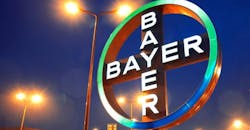Bayer Wins US Nod for Monsanto, Nearing End of Two-Year Quest
Bayer AG won U.S. antitrust approval for its $66 billion takeover of Monsanto Co., clearing the last major regulatory hurdle to form the world’s biggest seed and agricultural-chemicals provider after a nearly two-year review.
The companies reached a settlement with the Justice Department that resolves the government’s concerns that the merger as initially structured would harm consumers and farmers, the U.S. said on May 29. The agreement requires the sale of assets to BASF SE that Bayer has previously announced.
The divestiture package is worth about $9 billion, the largest in a U.S. merger enforcement case, the government said.
"America’s farm system is of critical importance to our economy, to our food system, and to our way of life," Makan Delrahim, the head of the department’s antitrust division, said. "American farmers and consumers rely on head-to-head competition between Bayer and Monsanto."
For Bayer, acquiring Monsanto is the last step in a corporate transformation as the 154-year-old company shed its plastics business and remade itself as a life-science company with equally-sized health and agriculture units. Once the deal is through, three global behemoths will dominate the world’s agriculture industry, a prospect that has left farmers worried about the possibility of higher prices and less choice.
Significant Divestitures
The settlement came together after Justice Department antitrust officials pressed for significant divestitures to remedy the competition problems from combining the two companies. The companies have received antitrust approval from most jurisdictions around the world. Bayer has said it’s confident the deal will close by the June 14 deadline.
Bayer expects to receive the remaining approvals it needs to finish the deal “very shortly,” the Leverkusen, Germany-based company said in a statement. The integration of Monsanto into Bayer can happen as soon as the BASF divestitures are finished, which will probably be in about two months, Bayer said.
Monsanto didn’t immediately respond to a request for comment.
The U.S. approval extends a series of tie-ups in the agricultural industry. Last year, U.S. and EU regulators approved two other major deals in the sector, Dow Chemical Co.’s merger with DuPont Co. and China National Chemical Corp.’s takeover of Syngenta AG. With about $48 billion in sales from their combined businesses, Bayer and Monsanto will surpass those of both DowDuPont Inc. and China National.
Competitive Harms
The Justice Department said without the asset sales, the merger would have created a range of competitive harms. Both companies sell seeds and chemicals to farmers, and the combination would have raised prices and reduced choice, the U.S. said. The deal as initially proposed also would have combined Bayer’s seed treatments with Monsanto seeds, giving Bayer the incentive and ability to raise prices that rival seed companies pay for treatments, the government said.
Both companies also compete in developing technology that improves crop yields for farmers, the government added.
"When BASF combines the divestiture assets with its existing portfolio of crop protection products, it will have the breadth of product offerings to step into Bayer’s shoes and be an effective competitor to the other integrated agricultural technology companies," Delrahim said.
Bayer initially agreed in October to sell some of its seed and chemical businesses to BASF for 5.9 billion euros (US$6.8 billion). The deal included the Liberty herbicide brand, cotton and soybean seeds, and seed-trait and breeding capabilities.
Then in April, Bayer said it was selling more pieces of its agricultural business to BASF for as much as 1.7 billion euros to satisfy regulators. That deal covered Bayer’s vegetable-seeds business, other herbicides, research on wheat hybrids, and Bayer’s digital farming business. Those businesses had combined sales of 2.2 billion euros last year.
By David McLaughlin, Lydia Mulvany and Naomi Kresge
About the Author
Bloomberg
Licensed content from Bloomberg, copyright 2016.
